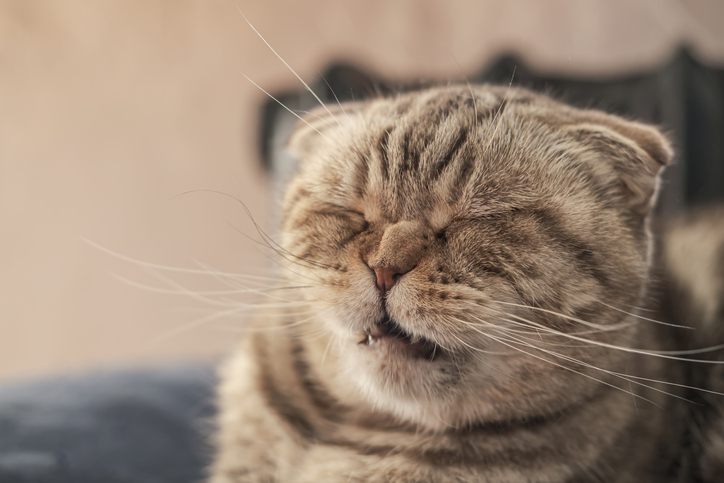Cat Sneezes: Common Causes and Remedies

Cat Sneezes: Common Causes and Remedies
As cat owners, we love our feline buddies and want nothing but the best for them. So, when we notice our beloved cats sneezing, it’s only natural to become concerned. Cat sneezes can be a common occurrence, but it can also be an indication of underlying health problems. In this article, we will examine the typical causes of cat sneezes and offer treatment to help keep our furry mates healthy and happy.
Causes of Cat Sneezes
There are many reasons your cat may be sneezing.
Allergies
Cats can be allergic to different elements in their environment. These allergens can include pollen, dust mites, mold, cigarette smoke, or specific types of food. When a cat confronts an allergen, it can lead to sneezing as the body attempts to rid itself of the irritant.
Upper Respiratory Infections
One of the most common causes of sneezing in cats is an upper respiratory infection. These infections are extremely infectious and can spread swiftly among cats in multi-cat households or shelters.
Bacterial Infections
Your cat’s sneezing may be due to a bacterial infection, and there are different kinds to be aware of.
Bordetella bronchiectasis
This bacterium is responsible for causing “kennel cough” in cats. It can lead to respiratory symptoms such as sternutation, coughing, and nasal discharge. Cats can catch this bacterium via direct contact with infected animals or exposure to tainted environments.
Chlamydophila Felis
Chlamydophila Felis is a bacterium that causes a respiratory infection known as feline chlamydiosis. Sneezing, runny nose, and conjunctivitis are ordinary symptoms of this infection.

Viral Infections
Just like bacterial infections, if a viral infection is the culprit behind your cat’s sneezing, it’s important to identify which virus it actually is.
Feline Herpesvirus (FHV-1)
Cats frequently get a viral illness. Stress or a weakened immune system can trigger recurrent episodes of sneezing and other symptoms. FHV-1 is highly contagious and can spread through direct contact or shared objects.
Feline Calicivirus (FCV)
Feline calicivirus is another common viral infection that affects the respiratory system in cats. Sneezing, nasal discharge, ulcers in the mouth, and fever are typical symptoms. FCV can also cause joint inflammation and lameness in some cases. It is highly contagious and spreads through direct contact or contaminated objects.
Fungal Infections
Finally, out of the three main types of infection, comes fungal infections.
Cryptococcus neoformans
Cryptococcus neoformans is a fungal organism that can cause respiratory infections in cats. It primarily affects the nasal cavity, causing sneezing, nasal discharge, and difficulty breathing. Cats can contract this fungus by inhaling spores from contaminated environments, such as soil or bird droppings.
Aspergillus
Aspergillus is a common fungal organism found in the environment. In some cases, it can cause nasal infections in cats, leading to sneezing, nasal discharge (often bloody), and facial deformities. Cats with weakened immune systems or pre-existing respiratory conditions are more susceptible to Aspergillus infections.
Foreign Objects
Cats are naturally inquisitive animals and can occasionally smell or inhale foreign contaminants, such as grass, dust, or tiny particles. When these objects irritate the nasal passages, sneezing can happen as an automatic response to clear the irritant.
Dental Problems
Dental disorders, such as gum disease or tooth abscesses, can exacerbate secondary nasal congestion. The presence of bacteria in the mouth can enter the nasal cavity and inflame them, leading to sneezing and nasal discharge.
Irritants and Chemicals
Strong aromas, such as fragrances, cleaning products, or certain compounds, might annoy a cat’s sensitive nasal passages, triggering sneezing as a response.
Nasal Polyps
Benign growths that can appear in a cat’s nasal cavities are called nasal polyps. These growths can restrict airflow which can result in sneezing, nasal secretions, and difficulty breathing(dyspnea). If you believe your cat has nasal polyps, consult with a veterinarian for accurate diagnosis and treatment options, which might entail surgical removal.
Stress
Stress can enfeeble a cat’s immune system, making them more prone to infections and allergies. Cats are creatures of regularity and can become anxious due to fluctuations in their atmosphere. Providing a peaceful and tension-free environment for your cat, with a lot of hiding spots, toys, and a steady routine, can help lessen stress-related sneezing.
Nasal Tumors
This is uncommon, but nasal tumors can cause sneezing in cats. These tumors can be benign or cancerous and can lead to bleeding, facial abnormalities, and weight loss. If you notice chronic sneeze accompanied by other concerning symptoms, consult with a veterinarian for a thorough assessment.
Remedies for Cat Sneezes
If your cat has been sneezing more frequently, here’s what you can do to help.
Veterinary Consultation
If your cat is frequently experiencing severe sneezing, it’s imperative to seek a veterinarian. A specialized examination can assist in determining the underlying reason and the best course of treatment. The veterinarian may advise tests such as blood work, nasal swabs, or X-rays to pinpoint the specific issue.
Allergen Management
If allergies are suspected, detecting, and terminating exposure to probable allergens is vital. Maintains a dust free, hoover regularly, and consider using air purifiers to decrease airborne allergens. Your vet may also suggest hypoallergenic cat food or medications to improve symptoms.
Vaccinations
Upper respiratory infections in cats can be avoided by being vaccinated. Ensure your cat receives scheduled immunizations, especially if they live in a multi-cat household or interact with other cats.
Nasal Flushing
In some circumstances, your veterinarian may suggest nasal flushing to aid clear the nasal passages and lighten congestion. This procedure should only be performed by a veterinary professional.
Air Quality
Maintain good air quality by using air purifiers or opening windows to let fresh air flow. This can help lower the presence of airborne particles that may trigger sneezing.
Environmental Control
Minimize exposure to potential irritants and chemicals by using pet-friendly cleaning products and avoiding strong perfumes or air fresheners. Additionally, ensure your cat has a safe, clean, and stress-free environment to support their overall health.
Supportive Care
If your cat has a mild respiratory infection, supportive care can help alleviate symptoms. Provide a warm and comfortable area for rest, ensure they stay hydrated, and offer nutritious food. You can also use a humidifier to moisten the air, which can soothe nasal passages.
Medications
In some cases, veterinarians may prescribe medications such as antihistamines, decongestants, or antibiotics to treat the underlying cause of sneezing. However, these medications should only be used under veterinary guidance.
Prevention
Preventing disease in cats can be more cost efficient in the long run, as well as keep your pet healthier. Here’s how to prevent sneezing in cats.
Vaccination
Vaccinating your cat against common viral infections, such as feline herpesvirus and feline calicivirus, can help reduce the risk and severity of respiratory symptoms.
Hygiene and Cleanliness
Maintaining a clean-living environment for your cat is crucial. Regularly cleaning litter boxes, bedding, and toys can help minimize the spread of bacteria and fungi that can cause respiratory infections.
Limiting Exposure
Limiting your cat’s exposure to potentially infected animals, crowded or stressful environments, and contaminated areas can help reduce the risk of respiratory infections.
Conclusion
Cat sneezing can be caused by various factors, including allergies, upper respiratory infections, foreign objects, dental problems, and irritants. Understanding the potential causes and implementing appropriate remedies can help alleviate sneezing and improve your cat’s overall well-being. Remember, if you notice any concerning symptoms or your cat’s sneezing persists, it’s essential to consult a veterinarian for a proper diagnosis and treatment. With proper care and attention, you can help your furry friend enjoy a sneeze-free and happy life.
If your cat has been sneezing more near Bulverde, TX, contact Bulverde Animal Hospital. Our veterinarians will find the root cause of your cat’s sneezing and help to resolve the issue. Give us a call today at (830) 438-7200, or request an appointment online.
Recent Posts
About Us
At Bulverde Animal Hospital, our ultimate goals are excellent service to clients, personal growth, and the professional development of our staff. We are a small clinic creating a significant impact on pets' lives.
